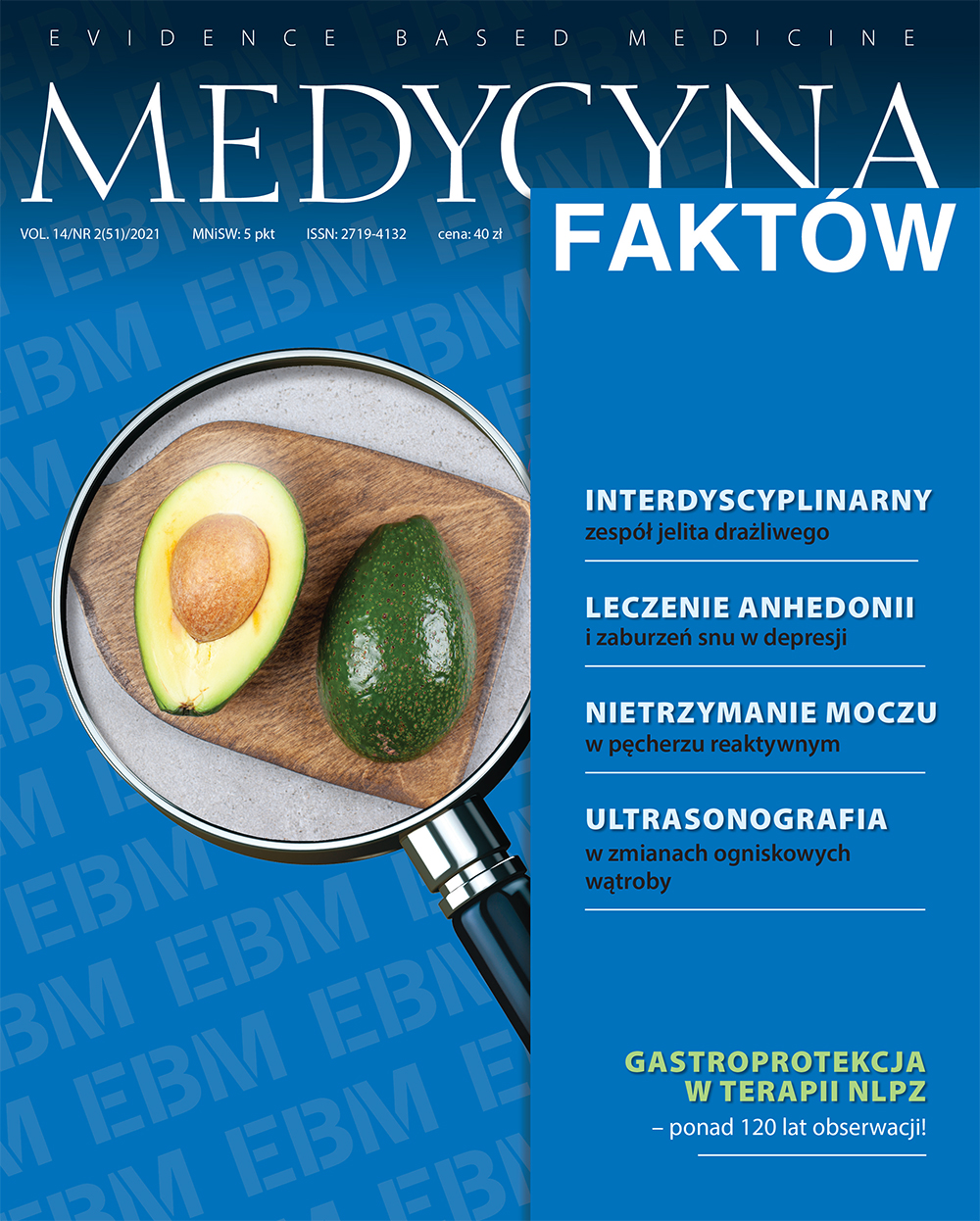Irritable bowel syndrome – risk factors and the role of antispasmodic drugs. The point of view of a gastroenterologist and psychologist Review article
Main Article Content
Abstract
Irritable bowel syndrome (IBS) is a highly prevalent, chronic disorder that significantly reduces patients’ quality of life. In clinical practice, IBS is characterized by symptoms of recurrent ab-dominal pain and disordered defecation. Rome IV criteria, derived by consensus from a multi-national group of experts, can be used to diagnose IBS. The pathophysiology of IBS is multi-factorial in nature, and it is thought to include contributions from factors such as gut microbiota dysbiosis, altered intestinal and colonic permeability, GI immune cell activation, visceral hyper-sensitivity, and abnormal gut-brain interactions. The first line therapeutic approach is directed towards education, reassurance and lifestyle modification. In case of an unsatisfactory response, an appropriate pharmacologic therapy can be suggested on the basis of digestive symptoms and/or psychological disturbances. Antispasmodic agents reduce the abdominal pain associated with IBS by inhibiting the postprandial contractility pathways in the gut wall and improve bow-el habits by increasing the colonic transit time, which reduces the frequency of stool passage, particularly in diarrhea-dominant IBS.
Article Details
Copyright © by Medical Education. All rights reserved.
References
2. Lacy BE, Pimentel M, Brenner DM et al. ACG Clinical Guideline: Management of Irritable Bowel Syndrome. Am J Gastroenterol. 2021; 16: 17-44.
3. Drossman DA, Hasler WL. Rome IV-functional GI disorders: Disorders of gut-brain interaction. Gastroenterology. 2016; 150: 1257-61.
4. Klem F, Wadhwa A, Prokop L et al. Prevalence, risk factors, and outcomes of irritable bowel syndrome after infectious enteritis: a systematic review and meta-analysis. Gastroenterology. 2017; 152: 1042-54.
5. Schmulson M, Ghoshal UC, Barbara G. Managing the inevitable surge of Post–COVID-19 functional gastrointestinal disorders. Am J Gastroenterol. 2021; 116: 4-7.
6. Lewis SJ, Heaton KW. Stool form scale as a useful guide to intestinal transit time. Scand J Gastroenterol. 1997; 32(9): 920-4.
7. Palsson OS, Baggish JS, Turner MJ et al. IBS patients show frequent fluctuations between loose/watery and hard/lumpy stools: Implications for treatment. Am J Gastroenterol. 2012; 107: 286-95.
8. Dionne J, Ford AC, Yuan Y et al. A systematic review and meta-analysis evaluating the efficacy of a gluten free diet and a low FODMAP diet in treating symptoms of IBS. Am J Gastroenterol. 2018; 113: 1290-300.
9. Chey WD, Shah ED, DuPont HL. Mechanism of action and therapeutic benefit of rifaximin in patients with irritable bowel syndrome: a narrative review. Ther Adv Gastroenterol. 2020; 13: 1-16.
10. Ford AC, Lacy BE, Harris L et al. Effect of antidepressants and psychological therapies in irritable bowel syndrome: An updated systematic review and meta-analysis. Am J Gastroenterol. 2019; 114: 21-39.
11. Adamowski T, Chładzińska-Kiejna S. Zespół jelita nadwrażliwego – zadania psychiatry i psychologa. Esculap.com.
12. Borys B, Sulkowska A, Guzek M. Dlaczego pacjenci z zespołem jelita nadwrażliwego są ,,trudni”. Praktyczne aspekty rozważań psychologicznych. Forum Medycyny Rodzinnej. 2011; 5(3): 247-50.
13. Niedziałek J, Pachla M, Kordyga A et al. Irritable bowel syndrom – psychatric issues. Curr Probl Psychiatry. 2019; 20: 35-48.
14. Wittmann T, Paradowski L, Ducrotté P et al. Clinical trial: the efficacy of alverine citrate/simeticone combination on abdominal pain/discomfort in irritable bowel syndrome – a randomized, double-blind, placebo-controlled study. Aliment Pharmacol Ther. 2010; 31: 615-24.
15. Mitchell SA, Mee AS, Smith GD et al. Alverine citrate fails to relieve the symptoms of irritable bowel syndrome: results of a double-blind, randomized, placebo-controlled trial. Aliment Pharmacol Ther. 2002; 16: 1187-95.

